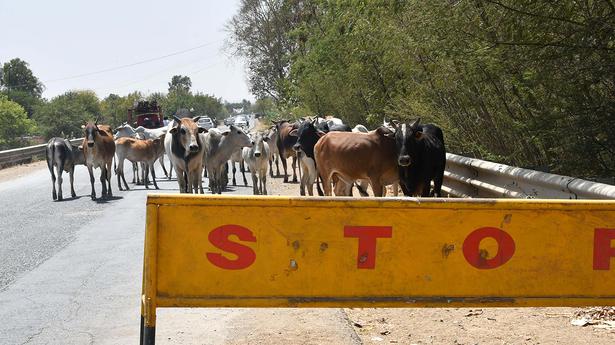
Over 900 deaths in accidents caused by stray cattle in Haryana in five years
The Hindu
Over 3,000 accidents due to stray cattle in Haryana in the same period
Over 900 people died in road accidents caused by stray cattle in Haryana in the last five years, the State government has informed the Assembly.
A total of 3,383 such road accidents occurred during the five-year period in the State, Agriculture and Animal Husbandry Minister J.P. Dalal said in response to a written question on Tuesday.
In these accidents, 919 people lost their lives and 3,017 sustained injuries, he said in response to a question raised by Independent MLA Balraj Kundu during the ongoing session of the Assembly.
Legislator Kundu also sought to know if there was any proposal under the government's consideration to solve the problem of stray cattle wandering on roads in the state.
In his response, Mr. Dalal said over one lakh stray animals have been rehabilitated during 2020-21 and 2021-22 in various shelters. The government was also providing financial assistance to these cow shelters, he added.
Mr. Dalal informed that financial assistance for fodder amounting to ₹17.75 crore, ₹29.50 crore and ₹13.50 crore during 2021-21, 2021-22 and 2022-23 (so far) respectively has been provided to 569 gaushalas registered with the Haryana Gau Seva Aayog.
"In order to control the male cattle population, the government is promoting the use of sexed sorted semen by providing it at a highly subsidised rate for artificial insemination," the Minister said in the reply.

“Writing, in general, is a very solitary process,” says Yauvanika Chopra, Associate Director at The New India Foundation (NIF), which, earlier this year, announced the 12th edition of its NIF Book Fellowships for research and scholarship about Indian history after Independence. While authors, in general, are built for it, it can still get very lonely, says Chopra, pointing out that the fellowship’s community support is as valuable as the monetary benefits it offers. “There is a solid community of NIF fellows, trustees, language experts, jury members, all of whom are incredibly competent,” she says. “They really help make authors feel supported from manuscript to publication, so you never feel like you’re struggling through isolation.”










